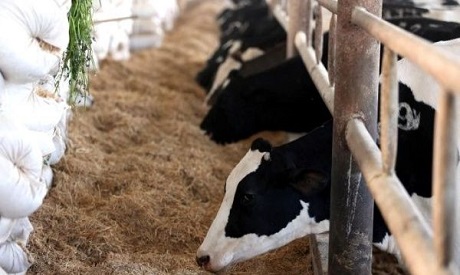
Last September, the PA stopped taking Israeli calves in light of prime minister Mohamed Shtayyeh's policy of "gradual economic disengagement" from Israel (Photo: Reuters)
The Israeli decision to stop receiving agricultural imports from the Palestinian Authority (PA) went into effect on Sunday at 6am following an announcement made on Friday by Israeli Defence Minister Naftali Bennett.
"Based on my instructions on Friday to the Coordinator of Government Activities, agricultural imports from the Palestinian territories have been stopped. This is due to the boycott of Israel's calves, which severely harmed hundreds of Israeli farmers. If the boycott stops, we will start receiving imports again," Bennett tweeted on Sunday morning.
According to a report published by Israeli news publication Haaretz, Israel's top defence official faced pressures from cattle growers to take this decision. In response, the PA said it would study the situation before taking any action.
The same report said that Israeli cattle growers have been selling about 140,000 calves a year to the Palestinians, which is worth roughly $290 million.
Last September, the PA stopped importing Israeli calves as part of Palestinian Prime Minister Mohamed Shtayyeh's policy of "gradual economic disengagement" from Israel.
Moreover, one month later, a PA spokesperson denied reports that the Palestinian decision had been reversed. This came following a report by Israel's Channel 11 about a Palestinian-Israeli agreement to stop the Palestinian boycott. Ibrahim Melhem described the decision as "irreversible."
The Israeli channel reported that the deal was concluded after a meeting that involved the director of the Agriculture Ministry, Shlomo Ben Eliyahu; the head of the civilian department in the Office of the Coordinator of Government Activities in the Territories (COGAT), Col. Sharon Biton; the PA deputy minister of agriculture; and a senior representative of Hussein Al-Sheikh, the head of the PA’s General Authority for Civilian Affairs.
Melhem said that Israeli and Palestinian officials had only met to deal with "phytosanitary and veterinary issues" and discuss prospects of importing vegetables and fruits from the Gaza Strip.
"The issue of the calves is a strategic decision," Melhem said, adding that "at its meeting yesterday, the [PA] government affirmed its determination to keep the ban. We will continue this policy of gradual disengagement [from Israel] in several areas such as the economy and industry,” the Jerusalem Post quoted him as saying.
On Saturday, the PA cut ties with the United States and Israel following the announcement by US President Donald Trump of his controversial peace plan.
“We’ve informed the Israeli side... that there will be no relations at all with them and the United States, including security ties," Palestinian President Mahmoud Abbas said while addressing an Arab foreign ministers meeting in Cairo.
Abbas said that he refused to talk to Trump on the phone.
Among the key points of the plan is the US' recognition to Israel's settlements in the West Bank despite the fact that they are illegal under international law.
It also stipulates that Jerusalem "will remain Israel's undivided capital." These are serious issues for the Palestinians, who have consistently demanded a two-state solution based on the 1967 borders.
Short link: